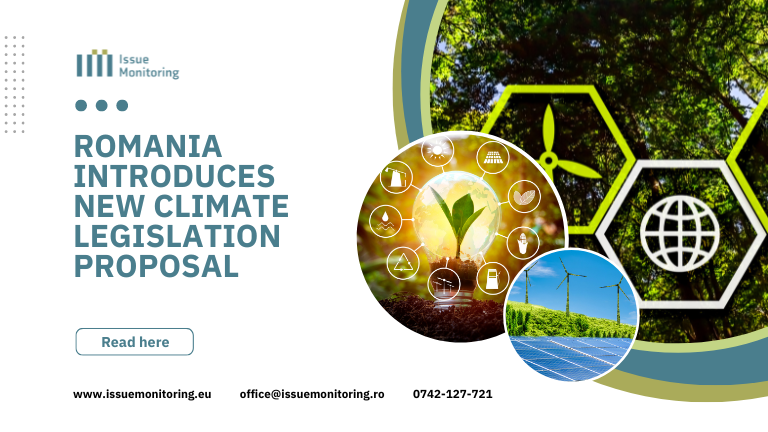
Yesterday, a new legislative proposal was unveiled aimed at integrating climate change mitigation and adaptation measures into national strategies, policies, and programs… sort of. This unexpected initiative, initiated by the PSD-PNL Coalition’s and UDMR MPs, stands a strong chance of being adopted, particularly since the governing alliance has a majority in the Parliament and could easily secure a favourable vote on its priorities. However, with the Parliament soon going into recess until September, the proposal might only see progress during the first half of the next parliamentary ordinary session or even towards the end of the year.
Key Aspects of the Legislative Proposal:
- Objective:
- Achieve climate neutrality by reducing greenhouse gas emissions and enhancing resilience to climate change.
- Set milestones, build resilience, monitor progress, ensure public access to information and consultation, and establish a financial framework.
- Principles:
- Climate policies based on legality, equitable emission reduction, predictability, cooperation, transparency, and transversality.
- Promote climate action skills (education, awareness, training, public participation) and respect for human rights and gender equality.
- Integrate climate adaptation and mitigation into all sectoral policies and activities.
- Scientific Advisory Council for Climate (CSCC):
- Establish a council of 15 members with 4-year mandates, selected based on scientific excellence and experience.
- The CSCC will provide advice on climate policies, approve legislative projects, collaborate with national and international entities, and develop climate policy evaluation reports.
- Emission Reduction Targets:
- Aim for net zero emissions by 2050, with intermediate targets for 2030 and 2040.
- Sector-specific emission reduction targets for energy, transport, construction, industry, agriculture, waste, and land use.
- Adaptation Policies:
- Improve adaptation and resilience to climate change through innovative, prioritized solutions and periodically updated national strategies.
- Monitoring and Reporting:
- Submit national emission inventory and transparency reports according to the Paris Agreement.
- Include monitoring and evaluation chapters in each sectoral mitigation plan.
- Final Provisions:
- The Government will adopt methodological rules and necessary normative acts within 180 days from the law’s entry into force.
Legislative Context:
Romania is trying to advance comprehensive climate legislation aligned with EU directives, aiming to mitigate the profound impacts of climate change on ecosystems and society. It establishes a Scientific Advisory Council to guide policy with transparency and supports economic transition through green job creation and sectoral diversification. Emphasizing stakeholder engagement, this piece of legislation promotes inclusive dialogue to enhance policy effectiveness and resilience across communities. By prioritizing adaptation strategies and aligning with global climate agreements, Romania seeks to ensure a sustainable future while contributing to international climate efforts.
Observations:
- This legislative move appears as a strategic electoral initiative.
- The proposal currently lacks substantial details on implementation and actionable measures beyond the establishment of the CSCC.
- The proposal states that responsible public authorities will aim to organize an inclusive and accessible process of public consultation at all levels, including national and local levels, involving academics, businesses, citizens, investors, associations, foundations, and civil society. This process aims to exchange best practices, identify actions to meet climate objectives, and analyze progress. The statement on public consultation is vague and lacks clarity on execution timelines and methods, presumably to be clarified in the forthcoming methodological norms.
As Romania continues to navigate its path towards climate neutrality, it remains crucial to monitor the development and implementation of this legislation to ensure it effectively addresses the country’s climate challenges.


